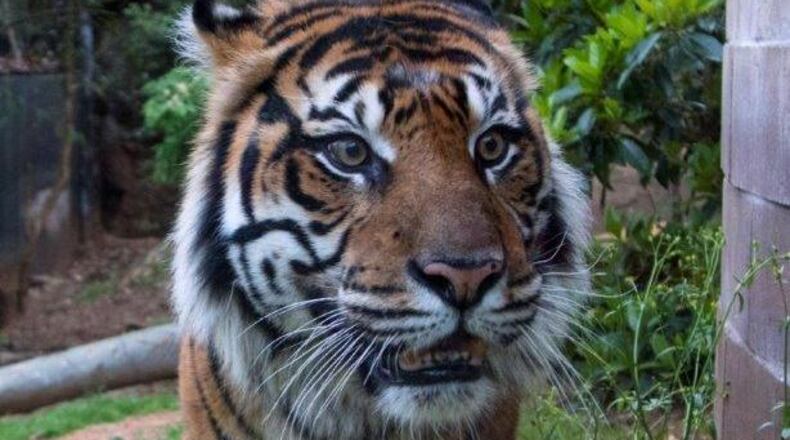Sparky, a Sumatran tiger at Zoo Atlanta and one of a tiny number of his species still living, died Wednesday.
At 18, Sparky was considered geriatric and was dealing with osteoarthritis and kidney disease. According to zoo officials, the old tiger recently experienced a broken tooth, which aggravated his other conditions.
“Given the slow deterioration of his condition, his age, and his poor long-term prognosis, the teams made the difficult decision to euthanize him,” the zoo wrote in a statement.
Born April 22, 2004, at the Fort Wayne Children’s Zoo in Indiana, Sparky was transferred to Zoo Atlanta in 2018, through the Tiger Species Survival Plan created by the Association of Zoos and Aquariums. It was hoped that Sparky would mate with Chelsea, a female Sumatran tiger at Zoo Atlanta.
Though both Chelsea and Sparky have produced offspring with other partners, their planned union was unsuccessful. At 19, Chelsea is also considered geriatric.
According to Zoo Atlanta, Sumatran tigers usually live to the age of 10 or 12 in the wild.
“While losing such a special and beautiful individual is never easy, we are especially disheartened by the loss of such a critically endangered animal,” said Jennifer Mickelberg, vice president of collections and conservation, in a statement
It is believed that there are only 400 Sumatran tigers alive in the wild, all of them on the Indonesian island of Sumatra. The critically endangered species is a victim of habitat destruction, mostly from the clearing of forests for palm oil plantations, and of poaching. Tigers are also targeted when they approach villages or livestock.
According to Zoo Atlanta, “All six remaining tiger subspecies are critically endangered or endangered, and three subspecies are recent extinctions. The Bali tiger, Caspian tiger and Javan tiger all went extinct in the 20th century. The South China tiger, which has not been documented in the wild since the 1980s, likely now only exists in human care.”
Zoo Atlanta has contributed to campaigns to preserve tigers in Sumatra. Those campaigns seek to reduce conflict between humans and tigers by erecting tiger-proof livestock pens in villages and by helping veterinarians care for tigers caught in the snares set by poachers.
A necropsy of Sparky will be conducted at the University of Georgia College of Veterinary Medicine.
About the Author
The Latest
Featured




